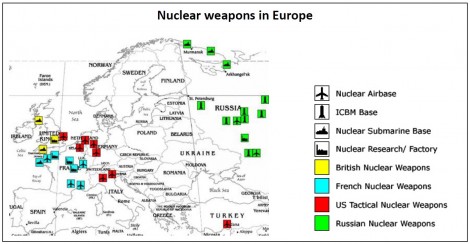Europe could be caught in nuclear cross-fire between Russia and the United States.
Join us for a discussion with Swiss and international speakers on new threats from nuclear weapons and what can be done about it.
Monday Jan 16. 17:00-19:00. Osaka Room, Floor 3, Messe Center, Messeplatz 21, Basel.
Renewed global threats:
• Tensions and nuclear threat postures between Russia and the West have risen to nearly Cold War levels;
• Europe is a region of conflicts, and of deployment of nuclear weapons on high alert and on first-use policies;
• Nuclear weapons have proliferated to additional States and could be acquired by terrorists;
Emerging solutions:
• Over ½ the world is now in Nuclear Weapon Free Zones;
• There are proposals for additions NWFZs in Europe, Middle East, NE Asia and the Arctic;
• The United Nations has initiated multilateral negotiations on nuclear disarmament and will hold a high level conference in 2018 to achieve a nuclear-weapon-free world.
Renowned Speakers:
* Prof. (em.) Andreas Nidecker, MD (Switzerland). President, Basel Peace Office. Past President & Board Member IPPNW Switzerland
* Arielle Denis (France), Consultant, International Peace Bureau
* Prof. (em.) Dr. Harald Müller (Germany), Director, Peace Research Institute of Frankfurt
* Alyn Ware (New Zealand), Global Coordinator of Parliamentarians for Nuclear Non-proliferation and Disarmament
Contact: www.baselpeaceoffice.org info@baselpeaceoffice.org
****************************************************************
Details: Europe and Nuclear weapons: Renewed global threat. Emerging solutions

Situation : With increasing East – West tension, the risk of a nuclear confrontation is on the rise again. Nuclear weapon states (NWS) continue to modernize their nuclear arsenals. New policies of the in-coming US Govt could increase the risks of armed conflict and nuclear war. Several new states may aim to also acquire nuclear weapons (horizontal proliferation).
On the positive side, the United Nations General Assembly has agreed (123 countries voting in favour) to commence negotiations in 2017 on a nuclear weapons prohibition treaty, and to hold a High Level Conference in 2018 (143 countries voting in favour) to build global support for such nuclear disarmament measures. This indicates increased self-confidence and an awareness of many countries about the risks and catastrophic consequences of a nuclear attack. Indeed, the entire Southern Hemisphere has already banned nuclear weapons in the region by establishing Nuclear Weapon Free Zones (NWFZs).
Content : The above described situation, the significance of the new UN initiatives and the concept of NWFZs, in particular a NWFZ in Europe, will be discussed. The latter could be realized in a phased process, firstly by non-nuclear European countries, followed by those in nuclear alliances and finally the nuclear-armed countries. Such a process is an alternative to the dangerous cycle of threats and counter-threats between Russia and NATO. It could help reduce tensions and build confidence, which would not only be beneficial for our common security, but also for business, trade and sustainable development in a secure environment without nuclear risks.
